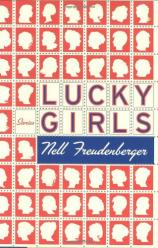Reading Group Guide
Discussion Questions
Lucky Girls: Stories

1. In this collection of five novella-like stories revolving around expatriate Americans living in Asia, each story turns on a moment of self-awareness. In "Outside the Eastern Gate," Nandani says, "traveling is for people who don't know how to be happy." What does she mean by that statement? Do the protagonists of each story eventually realize something about themselves? What is the object of each traveler's search?
2. "Although I don't feel the need to travel all over the world, I like hearing about foreign places" says Miss Fish in "Letter from the Last Bastion." Content with her life in Lancaster, PA, Miss Fish diverges sharply from the characters in the preceding stories. Miss Fish is also the least privileged of all the major characters. Compare Miss Fish to the narrator's mother, Jean, in "Outside the Eastern Gate," who is perhaps the most restless figure in this collection. Do their dissimilarities stem solely from innate differences in temperament? What are some ideas, presented in Lucky Girls, regarding the unglamorous notion of accepting one's lot in life?
3. Following Hemmingway's directive to writers, In "Letter from the Last Bastion" Henry uses the war as a whetstone, and becomes famous for his thinly veiled autobiographical novels. Yet the key passage in his book, "The Birder," never happened. "If you want to tell the true story of your life, you have to include the not only all the things you have done, but all the things you haven't" believes Henry, according to Miss Fish. Are possible courses of action as real as the one actually taken? Ultimately, who is the intended recipient of Miss Fish's letter? How does this story examine a writer's choices and the nature of storytelling?
4. In "Letter from the Last Bastion," Francois looks at Henry "as if he were being interrupted by a particularly irritating child." Are the other Americans in Lucky Girls also perceived as children by the people they encounter? Think of Mrs. Chawla's impatience at having to explain Indian social codes to the American mistress of her deceased son, who refuses to leave India, in "Lucky Girls"; the waiter, Chai's, exaggerated Americanisms in "The Orphan"; Nandani's attempts to buffer the children from their mother's rash impulses in "Outside the Eastern Gate." When Zubin, in "The Tutor," is a foreign student in America, he "felt as if he were surrounded by enormous and powerful children." Do you agree with this assessment? Could some American ideals be perceived as naïve when juxtaposed against another cultural backdrop?
5. In "The Orphan" Mandy reverses her initial accusation of rape, dismissing what happened as a "cultural misunderstanding." Do you think she's being naïve in the first instance or the second? Mrs. Chawla tells the narrator in "Lucky Girls" that she wasn't invited to her lover's funeral because "Nobody would've known what you were." Do you think these characters understand their foreign surroundings as well as they think they do?
6. In "The Orphan," when Alice looks at her recently-separated-from husband, she sees someone "who washes with a different soap, eats a different cereal or doesn't eat cereal, maybe doesn't eat breakfast at all; sleeps naked or with the windows open, listens to opera or salsa of bluegrass: a stranger." How important are these domestic details in truly knowing someone? How important are they to Alice? Consider the family unit as Alice would like it to be -- a postwar suburban ideal of a homemaker mother, authoritative father, sweet and smart daughter and a prodigal younger son. Are these roles anachronistic? How does being in Thailand expose each family member's desires and personalities? At the conclusion of the story, how precarious is Alice's hope of future happiness? Does happiness inevitably involve compromise?
7. Alice thinks her children's behave in Thailand as though they "had never been given breakfast, or stayed in an air-conditioned hotel." In "The Tutor," Julia thinks her sister liked to "pretend she was poor...and when she came to visit them in Paris she acted surprised." How does Zubin's inverted experience in America compare to those of the Americans' abroad? Why is does he feel embarrassed about borrowing his American roommate's sweaters, while Julia's sister, like Mandy in "The Orphan," revel in the novelty (or the pretense) of going without?
8. In "The Tutor," Zubin returns to India because in doing so "something would fall back in place, not just inside him but in front of him, like lengths of replacement track." If homesickness is, perhaps literally, a sense of dislocation, what is the 'something' that Zubin hoped would fall into place? Has he changed too much after his experiences in America? Consider the definitions of "home" that occur in this story. Julia's father believes that "you can bring your home with you"; in the market, a poster silently and grimly declaims, "Home is where. When you go there, they have to let you in." Do the characters in Lucky Girls fit Zubin's assessment: "Americans could go all over the world and still be Americans; they could live just the way they did at home and nobody wondered who they were, or why they were doing things the ways they did"? How would you define "home?"
9. In "Lucky Girls," Arun dislikes the Indian garb on Western women, "because clothes mean something here. Historically. And when you wear them it's for romance, glamour -- you don't mean anything." The narrator of this story admires a buffalo's shiny black coat, only to discover a buffalo carcass thickly covered in black flies. She admires the singing of a bird at night, only to be told that it's the sound an "all-clear" whistle from the patrolling night watchman. To her, "a red cricket ball ... looked like some kind of exotic bloom." Do these moments convey anything in particular about her understanding of India? Does she prove Arun correct despite her attempts to the contrary? In glossing over the malign, or even the ordinary, as beautiful, what sort of reality has she created for herself?
10. Consider the narrator's feelings for Arun and India in "Lucky Girls," Mandy's defense of Joo in "The Orphan," Laura's letters regarding Andreas in "Letter from the Last Bastion" -- is love separable from fascination with the exotic in these instances? The narrator's mother in "Outside the Eastern Gate" used to say that going back to America was like "waking up out of the most beautiful dream you'd ever had." Why do you think she relocates so often, venturing into a land more exotic each time? Why do you think she visited the temple in the derelict part of town? Is she searching for spiritual guidance or love? In either case, what compels her to search so far from her home, where her children are tremblingly eager to show her their love?
11. Where do these stories fit in the canon of travel literature? Do they rebuke the colonial fantasies of the past? Consider the Orphanage, the hotel, the Jim Thompson House and The Spice Route restaurant In "The Orphan." What do Thais promoting those fantasies for tourist dollars imply? All five novellas are consistent in tone -- ambiguous, wry, with light touches of deadpan humor. Did you find this unsettling? What are your expectations when reading about young women traveling in foreign countries?
Lucky Girls: Stories
- Publication Date: August 19, 2003
- Hardcover: 240 pages
- Publisher: Ecco
- ISBN-10: 0060088796
- ISBN-13: 9780060088798








